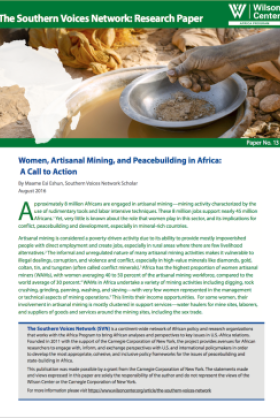Women, Artisanal Mining, and Peacebuilding in Africa: A Call to Action


Artisanal mining—small-scale mining with hand tools—provides a livelihood for 8 million people across Africa (who support tens of millions more). Yet it exists in a legal grey area, often prey to organized crime and conflict. Women artisanal miners, who make up significant percentages or majorities of workers in many mine sites, are marginalized within mines, overlooked by governments and NGOs, and left out of peacebuilding efforts. This marginalization can perpetuate the inequalities and grievances so often linked to natural resources, and it can prevent women from playing an effective role in resolving conflict. How can governments and NGOs work to formalize the sector, empower and support women miners, and give women miners and their organizations a key role in peacebuilding processes?
In this paired policy brief and research paper, Southern Voices Network Scholar Maame Esi Eshun presents her research and provides policy options on what African governments, international policymakers, and donors can do to empower women artisanal miners to build peace.
Please see the policy brief and the full 8-page research paper linked below.
This publication was made possible by a grant from the Carnegie Corporation of New York. The statements made and views expressed in this paper are solely the responsibility of the author and do not represent the views of the Wilson Center or the Carnegie Corporation of New York.
Author

Regulatory Research Analyst at the Public Utilities Regulatory Commission, Ghana

Africa Program
The Africa Program works to address the most critical issues facing Africa and US-Africa relations, build mutually beneficial US-Africa relations, and enhance knowledge and understanding about Africa in the United States. The Program achieves its mission through in-depth research and analyses, public discussion, working groups, and briefings that bring together policymakers, practitioners, and subject matter experts to analyze and offer practical options for tackling key challenges in Africa and in US-Africa relations. Read more

Explore More
Browse Insights & Analysis
Iraq Should Consider Extending UNAMI’s Mission


